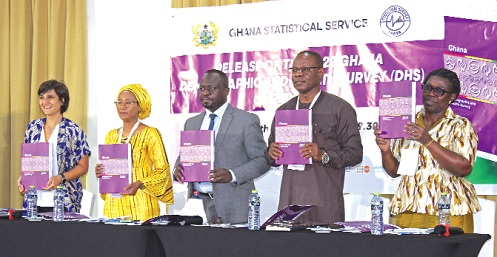
Domestic violence cases decline — Study
Domestic violence cases in the country have declined, the 2022 Ghana Demographic and Health Survey (GDHS) has revealed.
From 33.6 per cent recorded in the previous GDHS survey conducted in 2014, it declined to 28.4 per cent in this recent survey released on Thursday, January 18, 2024 at a ceremony in Accra.
The three perspectives that were used to measure domestic violence in the 2022 GDHS were emotional violence, physical violence and sexual violence.
Reading the findings of the 2022 GDHS report, the Government Statistician, Professor Samuel Kobina Annim, explained that although nationally, the country experienced a decline of domestic violence, the story was not the same across the 16 administrative regions.
Explaining further, he said four out of the 16 regions of the country saw one of the three forms of domestic violence the data was concerned with, increasing.
“We saw Ahafo Region increasing from 36.4 to 38.5 per, the Volta Region increased from 25.3 per cent to 36.3 per cent.
We also saw Western Region increasing from 21.3 per cent to 28.2 per cent, the highest retrogression and Western North Region, retrogressing from 21.3 per cent to 25.8 per cent.”
So, in these four administrative regions, the incidence of violence from an emotional point of view, the physical point of view or sexual point of view, overtime is increasing,” he explained.
Prof. Annim said the survey looked at the domestic violence incidence from trend perspective and that also showed that across the three domains - emotional, physical and sexual violence, there was a decline in emotional and physical violence.
However, from the sexual violence point of view, there was an increase of 1.1 percentage point nationally.
The DHS is a population-based survey designed to monitor progress on health service utilisation and management to inform decision-makers.
Since 1988, the DHS surveys have been conducted in Ghana led by the GSS.
The previous DHS were in 1988, 1993, 1998, 2003, 2008 and 2014.
The 2022 GDHS collected data from a nationally representative sample of approximately 18,540 households from all 16 regions.
Women empowerment/decision-making
Touching on decision-making and women empowerment, Prof. Annim said the 2022 DHS report revealed that 51.7 per cent of women were able to make informed decisions regarding sexual relations, contraceptive use and reproductive health care.
He disclosed that what was concerning was that compared to the other 16 administrative regions, the North East Region had a significantly lower number of women who made informed decisions on matters related to sexual relations, contraceptive use and reproductive health care.
“In the North East Region, we have less than a third of these women relative to the national figure of 51.7 per cent,” he emphasised.
Women marrying at a young age
On women marrying at a young age that is, children marrying before age 15 and those marrying before age 18, he said the current figures of 3.3 per cent for those less than 15 years and 16.1 per cent for those less than 18 years were suggestive that the country was doing less than ending child marriage by 2024.
“From the lens of the SDGs, these vulnerabilities should be eradicated completely by 2030.
If you look at the rate of change since the 1998 GDHS to the 2022 GDHS, there is no way we can reach that SDG goal of eradicating this form of early marriage either under age 15 or 18 by 2030,” he pointed out.
Other areas Prof. Annim touched on in the report were travel time to nearest health facility for women 15 to 49 years; menstrual hygiene for females 15 to 49 years; nutrition and reproductive, maternal and child health.
In a speech read on his behalf by Sharmila Lareef, the WHO Country Representative to Ghana, Professor Francis Kasolo, said with the release of the 2022 GDHS and other surveys, they could confidently say that Ghana would meet all the 44 SDG measurements data availability.
The Director—General of the Ghana Health Service (GHS), Dr Patrick Kuma-Aboagye, said they were gratified to see positive outcomes with substantial progress achieved in six out of the 15 targets of the 2022 to 2025 health sector development plan.

